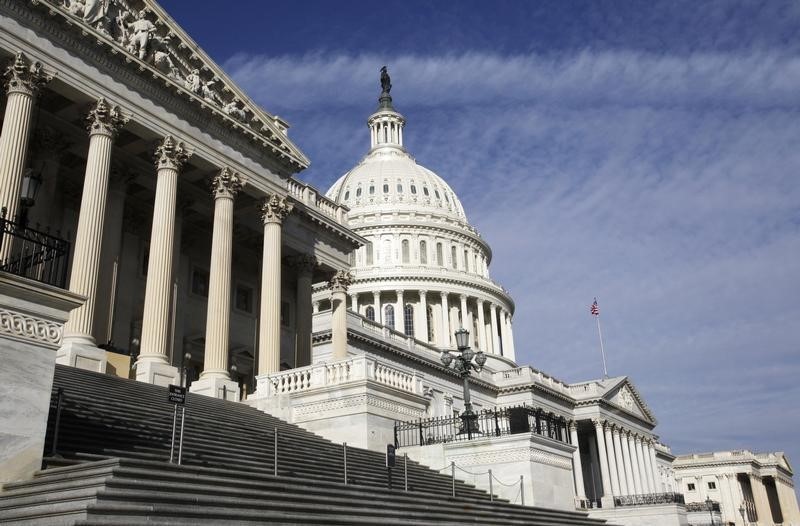By David Lawder and Susan Cornwell
WASHINGTON (Reuters) - Tea Party Republicans who led the charge into a 16-day government shutdown last year are now taking a more pragmatic approach as they weigh options on how to fight President Barack Obama's immigration order.
Pushed by their dissident wing, Republicans blocked government funding in September 2013 in a bid to stop Obama's healthcare reform law, but now numerous Tea Party members appear reluctant to take the battle over immigration that far.
Instead, even the most strident conservative Republicans are talking about a short-term funding fix that would keep the government running into early next year, when the party takes control of the Senate.
The government's funding authority expires on Dec. 11, providing possible leverage to opponents of Obama's plan to allow millions of undocumented immigrants to stay and work in the United States.
But more subdued rhetoric suggests they have little appetite for a repeat of what one conservative Republican described as "an epic battle" that pitted "Washington versus America."
"I don't think anybody is thinking about a shutdown," said Representative Raul Labrador, an influential Tea Party Republican who voted against the deal to end last year's shutdown.
Still, Labrador suggested that House Speaker John Boehner tipped his hand by proposing to secure full-year funding for all agencies, with the exception of the Department of Homeland Security, which would only get a short-term extension.
"In negotiations, you never take anything off the table," he said.
Representative Marlin Stutzman, who also advocated a hard line on Obamacare last year, however, backed Boehner's two-tier approach that secures most government funding through September 2015 but gives Republicans some leverage next year.
Boehner's plan appeals to many conservatives because it stresses the opportunities that will open up with full Republican control of Congress next year.
Even those who disagree are still fine with a short-term extension until January, when the Republicans will hold leverage over Obama on immigration, regulation and healthcare and be able to pass spending bills that better reflect their priorities.
NO APPETITE
"The cavalry is coming," said Jim Jordan, a prominent conservative Republican from Ohio. "Let's go for a short period of time and wait for our friends to get over in the Senate."
Representative Randy Hultgren of Illinois, another conservative who voted against reopening the government last year, said there was "no appetite" for a shutdown.
"We're taking this issue seriously but also realizing that we've got limited options and making sure that we are wise in using those options," he said.
Another reason that Tea Party activists are less fired up for a budget fight is that the public backlash against the 2013 shutdown has made the more mainstream Republicans wary of another such standoff, particularly given the party's ambition to recapture the White House in 2016.
With a bill to declare Obama's immigration order illegal expected to die in the Senate, Republicans admit that there is little they can do directly to stop Obama's order besides an explicit denial of funding.
Yet, in contrast to September 2013, Obama's immigration order lacks the visceral impact that the impending launch of Obamacare insurance mandates had at that time. Conservative groups such as the Club for Growth and the Heritage Foundation waged relentless campaigns urging lawmakers to stop Obamacare at all costs.
Republicans returned to Washington from a 2013 summer recess full of town hall meetings at which voters, fearing soaring insurance costs, implored them to do whatever necessary to stop the launch of Obamacare exchanges and a requirement that all Americans obtain health insurance.
This time around, the conservative groups are much less vocal. Club for Growth, for example, has said that it does not take a position on immigration issues.
Furthermore, while most Republicans are angry at Obama's unilateral move to grant what they see as "amnesty" for law breakers and a violation of the Constitution, immigration is a more complex issue.
Whereas it was politically easier to denounce flaws in Obamacare, some Republicans have large immigrant constituencies that would benefit from Obama's order.

Labrador said that while Boehner and other leaders were listening to conservative critics, he suspected they have already secured enough votes for the plan.
(Editing by Tomasz Janowski)